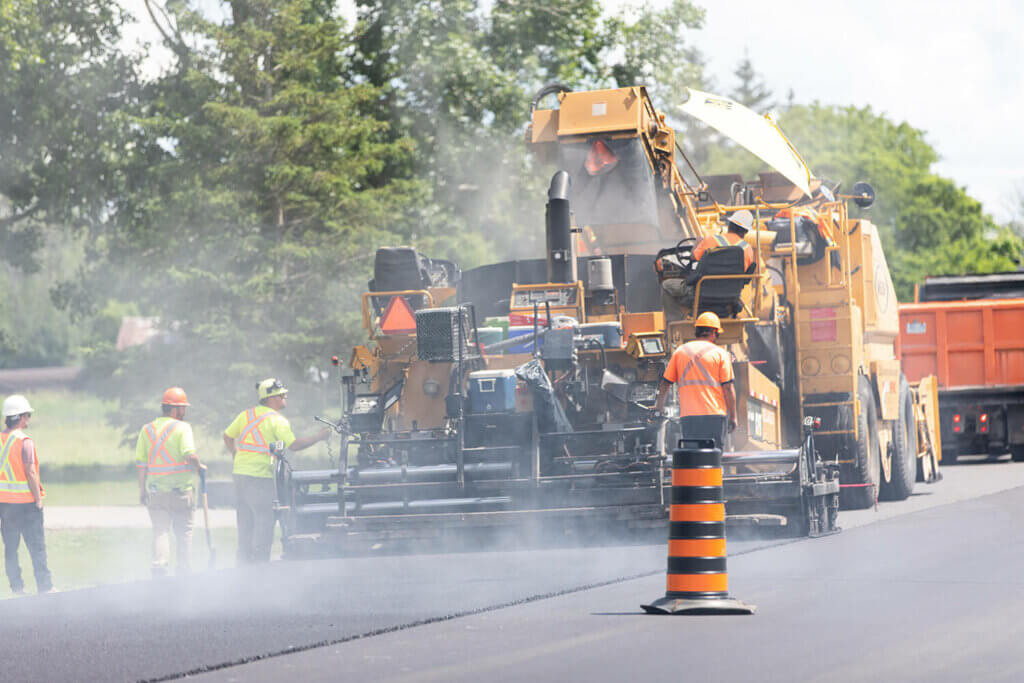
Understanding Asphalt Composition
Asphalt is a staple in the construction industry, used widely for road construction, parking lots, and airport runways. Its versatility and durability have cemented its position as a crucial construction material. But what exactly is it made of?
The answer lies in bitumen, a sticky, black, and highly viscous liquid also known as asphaltic cement. It acts as a binding agent that holds together the aggregate, typically a mix of sand, gravel, or crushed stone.
Different Types of Asphalt and Their Uses
Asphalt, known for its durability and resilience, comes in several types, each tailored to fulfill specific applications and performance requirements. The most common form is Hot Mix Asphalt (HMA), typically used in high-traffic applications like main roads, highways, and airport runways. HMA is produced at high temperatures and is known for its ability to withstand varying weather conditions and heavy traffic loads. It is a blend of approximately 95% stone, sand, or gravel bound together by asphalt cement.
On the other hand, Warm Mix Asphalt (WMA) is produced at temperatures 20 to 40 degrees Fahrenheit lower than HMA, making it more eco-friendly due to reduced carbon emissions. This quality, coupled with its ability to be handled and worked at lower temperatures, makes WMA a favourite for certain projects, particularly in cooler climates or in environmentally sensitive areas.
Cold Mix Asphalt is produced at ambient temperatures, which means it is not only more energy-efficient but also can be stored and reused. It is often used for temporary road repairs and maintenance, proving a viable option when hot mix can’t be used.
Lastly, Porous Asphalt is designed to allow water to permeate its surface and pass into the layers below, offering a solution for stormwater management. This type is particularly useful in car parks and other areas where surface water runoff can be an issue.
The Process of Making Asphalt
The process of making asphalt is a meticulous one, involving a sequence of carefully coordinated steps. These steps, while distinct, work in harmony to transform raw materials into the sturdy asphalt we see on roads and pathways.
The procedure begins with the aggregate, a mixture of various sized particles of stone, sand, and gravel. This aggregate is subjected to intense heat and thoroughly dried. Heating and drying the aggregate ensures that moisture won’t weaken the asphalt, providing a strong and stable base for the following steps.
Once the aggregate has been prepared, it is mixed with liquid asphalt cement. This is a critical stage in the process as the liquid asphalt serves as the binding agent that holds the aggregate together. The mixture takes place at high temperatures, which aids in maintaining the fluidity of the asphalt cement, ensuring a uniform coating of the aggregate.
This hot mix is then kept at a specific temperature until it’s delivered to the construction site. Temperature management during transportation is crucial as the hot mix needs to remain workable until it is spread and compacted.
Upon arriving at the construction site, the hot mix asphalt needs to be spread and compacted while it is still hot. Compaction, achieved through heavy rolling machinery, ensures the asphalt’s strength and durability.
Following the compaction, the asphalt mix is left to cool. As it cools, the asphalt hardens, ready for use. From heating to compaction, each step in the process is geared towards producing a final product that can withstand the pressures of use and time. The making of asphalt is indeed a testament to the marvels of modern construction technology and methodology.
Environmental Impact and Recyclability of Asphalt
Despite its petroleum-based composition, asphalt is surprisingly eco-friendly. It is the most recycled material in the U.S., with old roads, shingles, and other asphalt waste regularly being repurposed into new roads. This reduces the need for new raw materials and minimizes landfill waste.
Innovative Developments in Asphalt Technology
In an industry that constantly evolves, innovations in asphalt technology are continuously emerging, making the material more versatile, eco-friendly, and efficient to use. One such innovation is the advent of Warm Mix Asphalt technologies.
These technologies enable the asphalt mixture to be produced and placed at significantly lower temperatures than traditional Hot Mix Asphalt. This reduction in production temperature leads to less energy consumption and fewer emissions, marking a substantial step towards environmental conservation in road construction.
Similarly, the utilization of Recycled Asphalt Pavements (RAP) and recycled asphalt shingles in new asphalt mixtures has seen a significant rise. The integration of recycled materials into new asphalt not only reduces material costs but also enhances the sustainability of the production process.
This trend of increasing the use of recycled materials in asphalt production underlines the industry’s commitment to environmental stewardiness and sustainability.
The development and application of Perpetual Pavements is another breakthrough in asphalt technology. These are multi-layered flexible pavements designed to last longer than traditional pavements and require only periodic maintenance, usually in the form of replacing the surface layer. This drastically reduces the life-cycle cost of the pavement, making it an attractive option for long-term infrastructure planning.
Technologies like Intelligent Compaction, which provides real-time feedback about compaction efforts, are enhancing the quality control and assurance processes in asphalt pavement construction, making the process more efficient and ensuring higher quality in the final product.
A.L. Blair’s Expertise in Asphalt Production
At A.L. Blair Construction, we are proud to contribute to the evolving world of asphalt. We deliver high-quality asphalt products, crafted with precision and care. Our experts stay updated with the latest trends and technologies in asphalt production, ensuring we provide top-tier materials that meet modern needs.
Our commitment to quality, innovation, and sustainability guides our asphalt production, helping us serve our clients effectively while making a positive environmental impact.
